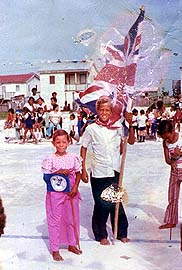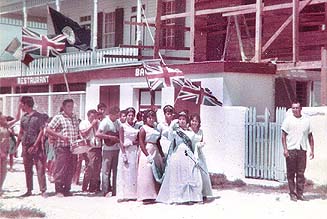
|
|
25 YEARS AGO ON AMBERGRIS
CAYE BY ANGEL NUÑEZ

|
What It Felt Like To Live in British Honduras
|
Everyone who was born before 1973 was not born as a Belizean, but rather as a citizen of British Honduras. British Honduras was a colony of Great Britain; therefore we were British so to speak, even though we were not citizens of England or Great Britain.

| | Young Patty Arceo and Charlie Leslie display British flag at Central Park.
|
To begin with the passports we held clearly said "British Honduras". The face of the queen of England, Queen Elizabeth II, appeared on the passport. The money we used all had the face of The Queen as it does today, but the words Central Bank of Belize never appeared on our currency. The coins had the image of King George and Prince Phillip.
Whenever we went to parade, there was no blue and white flag. Instead we used the Union Jack, or the flag of England. I can still remember singing the National Anthem of Great Britain, which began with the words: "God save our gracious Queen. Long lived our Noble Queen. God save the Queen." We all stood at attention when this song was sung or played, and we also stood at attention when the queen's representative visited our island. The queen's representative was the Governor. He was naturally a white man and lived at the Governor's House in Belize City. He was tall and looked important, dressed in all white and wore a helmet looking headpiece. To us the visit of the Governor was like the coming of Christ. All kinds of preparations were made for his visit, including the decoration of the main pier with coconut palms and a few British flags. We gave our allegiance to the Queen for help came from England in many forms. When there was a feeding program in school, it was the Queen and the Commonwealth that assisted. After Hurricane Hattie in 1961, it was the British Army that first came to our rescue and aid.

| | Beauty queens parade waving both Belizean and British Flags.
|
In school our textbooks had a British origin, and our math problems dealt with pounds, shillings, and pence, never dollar and cents. In those days one British pound was worth four dollars and the American dollar was nonexistent in Belize. The mathematical table we had to memorize and apply was like this: "Twelve pence one shilling. Twenty shillings one pound."
It was not until 1964 that our country was given a political status called Self-Government and then the power was transferred from the Queen to a Premier. George Price was the first Premier to be elected in Belize. In San Pedro there was a ballot box and about thirty people voted, all of them for Mr. George Price for the opposition the NIP (National Independence Party) had very little representation. Then in 1973 the name of British Honduras was officially changed to Belize. We got a new name, a new identity, a new country to live and die for. Such was life twenty five years ago under the Queen of England.
| |



